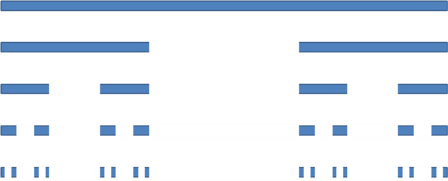Cantor SetYou are currentlynot logged in Click here to log in |
|
||||||||
Cantor SetYou are currentlynot logged in Click here to log in |
|
||||||||
|
It is formed by taking the closed interval $[0,1]$ and repeatedly taking the middle third from any line segment.
Therefore at the first iteration the open set $(\frac{1}{3},\frac{2}{3})$ is removed.
|
At the second iteration two open sets (1/9,2/9) and (7/9,8/9) are removed.
At this point the set consist of the union of four closed intervals namely $[0,\frac{1}{9}]\cup[\frac{2}{9},\frac{3}{9}]\cup[\frac{6}{9},\frac{7}{9}]\cup[\frac{8}{9},1]$
This procedure of taking the open set in the middle of each line segment is repeated ad infinitum. What remains is the Cantor Set.

Consider all numbers in the interval [ 0, 1] written in tertiary (base 3).
At the first iteration, numbers with the form 0.1... (base 3) will be removed leaving numbers 0.0...(base 3) and 0.2... (base 3).
At the second iteration numbers with 1 in the second tertiary place will be removed.
At the nth iteration only numbers with 1 in the nth tertiary place will be removed.
Therefore, the Cantor Set consists of all number, in tertiary, with either zero or two in any position after the radix point. e.g. 0.200220222200...
1/4 = 0.0202020202 ... (base 3) is a point in the Cantor Set.
Enrichment
Show that 1/4 is not an end point of intervals.
Counting up the length of the interval that are removed at each iteration.
1/3 + 2/9 + 4/27 + 8/81 .... = 1
The "length" removed is 1 however the Cantor set is uncountably infinite.
The Cantor set is fractal.
The analysis and properties of the Cantor set are rich and intersecting.
| CountableSet TransfiniteNumbers UncountableSet |
(none) | (none) | ||||
| GeorgCantor | (none) | |||||
| ⇌ |
You are hereCantorSet |
|||||
| (none) | ||||||
| ContinuumHypothesis CountableSet FamousPeople NaturalNumber RealNumber TransfiniteNumbers UncountableSet |
(none) | (none) | ||||
|
Last change to this page Full Page history Links to this page |
Edit this page (with sufficient authority) Change password |
Recent changes All pages Search |